
Journal of Fish and Wildlife Management
Scope & Guideline
Bridging science and practice in fish and wildlife management.
Introduction
Aims and Scopes
- Fisheries Management and Conservation:
The journal emphasizes research on sustainable fisheries practices, population dynamics, and management strategies for various fish species, highlighting the importance of informed decision-making in fisheries management. - Wildlife Ecology and Conservation:
Research on wildlife species, their habitats, interactions with ecosystems, and conservation strategies is a core focus. The journal publishes studies that assess population viability, habitat use, and the impacts of anthropogenic activities. - Ecological Research and Methodologies:
The journal promotes innovative research methodologies, including modeling, telemetry, and bioacoustic monitoring, to enhance understanding of ecological dynamics and species interactions. - Human-Wildlife Interactions and Management:
Papers addressing the implications of human activities on wildlife populations and habitats, including land use changes and conservation policies, are prominently featured, reflecting the journal's commitment to integrating social and ecological perspectives. - Biodiversity and Ecosystem Services:
The journal recognizes the importance of biodiversity in ecosystem functioning and services, publishing research that explores the relationships between species diversity, ecosystem health, and management practices.
Trending and Emerging
- Climate Change Impact Studies:
Research examining the effects of climate change on fish and wildlife populations is gaining traction, highlighting the need for adaptive management strategies in response to shifting environmental conditions. - Conservation Genetics and Genomics:
There is an increasing focus on genetic studies that inform conservation strategies, including population viability analyses and the genetic health of species, which are essential for effective management. - Innovative Monitoring Techniques:
Emerging methodologies such as remote sensing, bioacoustic monitoring, and advanced telemetry are being increasingly adopted, facilitating more effective and efficient data collection for wildlife research. - Human-Wildlife Conflict Mitigation:
Research addressing strategies to mitigate human-wildlife conflicts is trending, reflecting the growing need to balance wildlife conservation with human interests and activities. - Ecosystem Services and Management:
The integration of ecosystem services into fish and wildlife management practices is becoming more prominent, emphasizing the importance of understanding the benefits provided by healthy ecosystems for human well-being.
Declining or Waning
- Traditional Angling Studies:
Research focused solely on traditional angling practices has decreased, as the journal shifts towards more integrative and comprehensive approaches that consider broader ecological impacts and management strategies. - Species-Specific Research Without Management Implications:
Papers that provide species-specific data without direct relevance to management practices or conservation strategies have become less frequent, indicating a trend towards research that directly informs policy and management. - Historical Fisheries Assessments:
While historical assessments of fisheries have been valuable, there is a waning interest in studies that do not incorporate modern management frameworks or address current ecological challenges. - Static Habitat Studies:
Research focusing on static habitat characteristics without considering dynamic ecological processes or the impacts of climate change and anthropogenic influences has seen a decline, as more emphasis is placed on adaptive and responsive management. - Laboratory-Based Research:
There is a noticeable reduction in laboratory-based studies that do not have direct field applications, with a growing preference for field studies that provide real-world implications for management.
Similar Journals

BIODIVERSITY AND CONSERVATION
Advancing knowledge for a sustainable future.Biodiversity and Conservation is a leading peer-reviewed journal published by Springer, dedicated to advancing the understanding of biodiversity and the critical aspects of conservation biology. With an impact factor that consistently places it in the Q1 category across multiple fields including Ecology, Evolution, and Nature and Landscape Conservation, this journal serves as a vital resource for researchers, professionals, and students who aim to address the pressing challenges of biodiversity loss and ecosystem management. Established in 1992, the journal has successfully created a platform for high-quality research and innovative approaches, facilitating the dissemination of knowledge that informs conservation practices globally. With a strong ranking in Scopus, it highlights the importance of rigorous scientific inquiry in the preservation of our natural world. Subscribers can access a wealth of articles that encompass a broad range of topics pertinent to both theoretical and practical aspects of biodiversity, encouraging an interdisciplinary dialogue among the diverse fields of environmental science and conservation.

EUROPEAN JOURNAL OF WILDLIFE RESEARCH
Advancing wildlife conservation through interdisciplinary research.European Journal of Wildlife Research, published by SPRINGER, is a key academic resource in the fields of ecology, evolution, behavior, and systematics, as well as management, monitoring, policy, and law related to wildlife conservation. With an impressive Q2 categorization among its peers, this journal serves as a vital platform for interdisciplinary research, fostering dialogue among researchers, conservationists, and policymakers. The journal focuses on innovative studies that delve into wildlife ecology, population dynamics, and species management, contributing significantly to our understanding and preservation of biodiversity in various landscapes. Although its coverage in Scopus ended in 2003, the journal's heritage is deeply rooted in the field, dating back to its inception in 1955, and continues to influence contemporary research practices. As an open-access journal, it allows for broad dissemination of knowledge, ensuring that vital findings reach a global audience, making it a valuable reference for students, professionals, and academics committed to wildlife research.
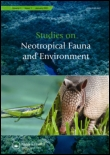
STUDIES ON NEOTROPICAL FAUNA AND ENVIRONMENT
Unveiling the Secrets of Neotropical EcosystemsSTUDIES ON NEOTROPICAL FAUNA AND ENVIRONMENT is a distinguished academic journal published by Taylor & Francis Ltd, dedicated to advancing the fields of Animal Science, Zoology, and Ecology. With an ISSN of 0165-0521 and an E-ISSN of 1744-5140, this journal has been a significant outlet for scholarly research since its inception in 1976, continuing to provide critical insights into neotropical biodiversity and the environmental intricacies of this rich ecological region through 2024. Recognized in the Q3 category for both Animal Science and Ecology, the journal ranks at #232/490 in Animal Science and Zoology and #402/721 in Ecology, marking it as a valuable resource for researchers, professionals, and students interested in ecological and zoological studies. By offering a platform for innovative research and comprehensive reviews, the journal aims to bridge the gap between theory and practical application, facilitating a deeper understanding of the unique challenges and conservation strategies relevant to neotropical ecosystems. Although not an open-access journal, it plays a crucial role in fostering academic discourse and knowledge dissemination in its field, ensuring that critical advancements in understanding neotropical fauna and environmental dynamics reach a diverse and engaged audience.
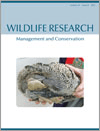
WILDLIFE RESEARCH
Advancing the Science of Wildlife ConservationWILDLIFE RESEARCH is a leading journal dedicated to the rigorous study of wildlife ecology and management, published by CSIRO PUBLISHING in Australia. With a notable ISSN of 1035-3712 and an E-ISSN of 1448-5494, this prestigious journal has been at the forefront of advancing knowledge in the fields of ecology, evolution, behavior, and systems since its inception in 1974. Spanning over four decades, WILDLIFE RESEARCH has established itself as a Q1 journal in Ecology, Evolution, Behavior and Systematics and Q2 in Management, Monitoring, Policy and Law as of 2023, indicating its substantial impact and relevance in these critical areas. It ranks impressively in Scopus, with scores in the 72nd and 58th percentiles respectively for its categories, reflecting its commitment to high-quality research. The journal does not offer open access options, but it provides valuable insights for researchers, professionals, and students aiming to contribute to wildlife conservation and management practices. As it approaches its 50th year, WILDLIFE RESEARCH continues to play an essential role in shaping the discourse around environmental science, policy, and biodiversity conservation in the global landscape.
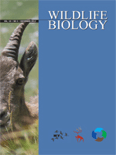
WILDLIFE BIOLOGY
Advancing knowledge in wildlife conservation and ecology.WILDLIFE BIOLOGY is a prestigious open-access journal published by WILEY, dedicated to the dissemination of high-quality research in the fields of ecology, evolution, behavior, and conservation. With an impressive Impact Factor indicative of its scholarly relevance, the journal has been a cornerstone for researchers since its inception in 1995, now extending its convergence through 2024. Recognized within the top Q1 and Q2 quartiles across various categories—including Ecology, Evolution, Behavior and Systematics and Management, Monitoring, Policy and Law—this journal plays a crucial role in fostering knowledge and promoting effective solutions in wildlife biology. The journal serves a diverse audience, offering robust access options since 2014, ensuring that vital research is freely available to professionals, researchers, and students alike. With its base in Denmark, the journal encourages contributions that address pressing wildlife management issues and informs policy development, further cementing its significance in the ecological research community.
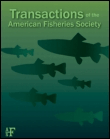
TRANSACTIONS OF THE AMERICAN FISHERIES SOCIETY
Exploring the depths of aquatic ecology and management.TRANSACTIONS OF THE AMERICAN FISHERIES SOCIETY, published by Wiley, is a leading journal dedicated to the field of fisheries science and aquatic ecology, with a rich history dating back to its inception in 1872. As an esteemed publication within the realms of Aquatic Science and Ecology, Evolution, Behavior, and Systematics, it currently holds a Q2 quartile ranking, demonstrating its significance and influence in these disciplines. The journal is not open access, which enables a curated peer-review process while ensuring high-quality research dissemination. The journal serves as a vital platform for scholars and practitioners alike, providing essential insights into the management and conservation of aquatic resources. Its commitment to addressing contemporary challenges faced in fisheries and aquatic environments makes it indispensable for researchers, professionals, and students seeking to contribute to this dynamic field.
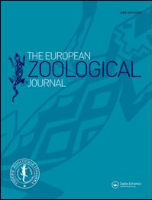
European Zoological Journal
Fostering Global Collaboration in Animal ResearchEuropean Zoological Journal, published by Taylor & Francis Ltd, is an esteemed open-access publication dedicated to advancing the exciting field of zoology. Since its inception in 2017, this journal has progressively established itself as a vital resource for researchers, professionals, and students alike. With its Q2 ranking in Animal Science and Zoology as of 2023, the journal ranks in the 69th percentile among its peers, showcasing its influence and contribution to the discipline. The journal’s broad scope covers a wide range of topics within zoology, aiming to foster an understanding of animal biology and conservation efforts. As an open-access journal, it not only enhances the dissemination of knowledge but also encourages collaborative research across global communities. Situated in the United Kingdom, the European Zoological Journal invites submissions that contribute to the evolving discourse in animal sciences, and endeavors to support the scientific community in addressing pressing ecological challenges.
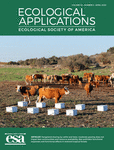
ECOLOGICAL APPLICATIONS
Pioneering research for the preservation of our planet.ECOLOGICAL APPLICATIONS, published by WILEY, is a leading journal in the field of ecology, providing a platform for innovative research that addresses the understanding and management of ecological systems. With an ISSN of 1051-0761 and E-ISSN of 1939-5582, it has established itself as a vital resource for ecologists and environmental scientists since its inception in 1991. Ranked in the top quartile (Q1) for Ecology in 2023 and with a Scopus ranking of 40 out of 461 in Environmental Science, ECOLOGICAL APPLICATIONS boasts an impressive impact factor, attesting to its significance and influence in the field. The journal's mission is to publish peer-reviewed articles that contribute to ecological theory and its applications in conservation and environmental management. Researchers, professionals, and students alike will find invaluable insights and the latest developments in ecological research through its comprehensive scope and rigorous scholarship, ensuring a crucial role in shaping future ecological practices and policies.

CALIFORNIA FISH AND GAME
Diving Deep into California's Ecological RichnessCalifornia Fish and Game is a prominent journal dedicated to the fields of Animal Science and Aquatic Science, published by the California Fish and Game Editor. With its roots extending back to 1979, the journal has served as a vital platform for disseminating research focused on the wildlife and aquatic ecosystems of California and beyond. Recognized within the Q4 quartile for both Animal Science and Zoology and Aquatic Science, it provides critical insights and scholarly contributions, despite its comparative rankings within the respective categories. The journal, with an ISSN of 0008-1078 and an E-ISSN of 2331-0405, offers an invaluable resource for researchers, professionals, and students alike, looking to deepen their understanding of California's rich biodiversity and ecological challenges. For those interested in open access options, further details can be reviewed through the journal's platform. By fostering a community of inquiry, California Fish and Game plays an essential role in advancing knowledge and conservation efforts in the fields of interest.

California Fish and Wildlife Journal
Innovating Strategies for Biodiversity and Habitat PreservationCalifornia Fish and Wildlife Journal, published by the California Department of Fish and Wildlife, is a pivotal platform dedicated to advancing the understanding of fish and wildlife management and conservation. As an open access journal, it fosters collaboration and knowledge sharing among researchers, practitioners, and students interested in aquatic and terrestrial ecosystems. With a focus on empirical research, policy implications, and innovative conservation strategies, the journal plays a crucial role in informing both scientific communities and decision-makers alike. Researchers seeking to contribute to critical discussions on sustainability, habitat preservation, and biodiversity will find this journal an essential resource. The journal’s commitment to disseminating knowledge about California's rich natural resources enhances its stature in the field of wildlife management and conservation studies.